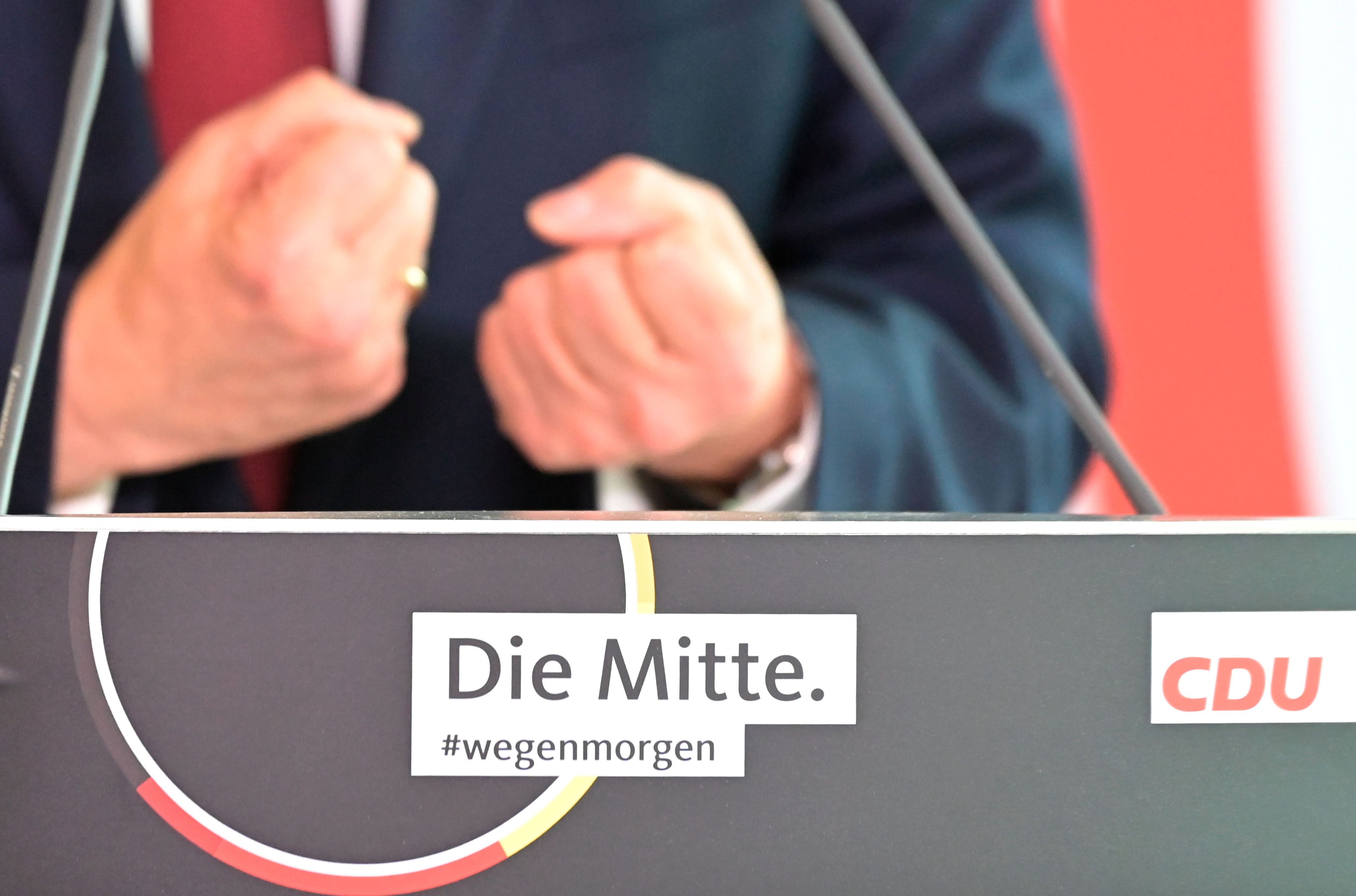
In state elections in Baden-Württemberg and Rhineland-Palatinate in March, the CDU achieved its worst results ever in both regions, winning just 24.1% and 27.7% of the votes, respectively. At the same time, public opinion polls indicate a serious decline in the ratings of the Christian Democrats at the federal level: according to the Kantar institute, CDU/CSU is at 25% (13 percentage points less than in April 2020). Additionally, 62% of respondents have a negative opinion of the federal government’s management of the COVID-19 pandemic. The unsatisfactory results in the regional elections and low polling are warning signals for the Christian Democrats, indicating the prospect of a serious reduction in representation in the Bundestag after this year’s elections or even a transition to the opposition.
Internal Party Problems
One of the main reasons for the Christian Democrats’ recent election failures is the so-called mask scandal. In the spring of 2020, members of the Bundestag Nikolas Löbel (CDU) and Georg Nüßlein (CSU) were alleged to be collecting a commission for brokering the purchase of masks for private entities as well as for regional and federal institutions. This meant that members of the ruling party benefited financially from the provision of protective materials, the quick delivery of which was decisive for the life and health of citizens represented by the politicians. The MPs’ actions were a blow to the image of the grouping, which refers to integrity and ethics as the most important elements of the party’s identity. The situation was aggravated by the appearance of accusations against other CDU and CSU politicians, such as Bundestag deputy Mark Hauptmann who was accused of accepting money for lobbying for Azerbaijan, Vietnam, and Taiwan.
The non-parliamentary activity of the Christian Democrats, the electoral defeat in two large federal states, and the decline in support for the CDU/CSU also weaken the position of Armin Laschet as the CDU’s new leader. The loss in Baden-Württemberg, where the second-largest regional association of the CDU operates, is particularly severe. Another problem is the low popularity of the politician: in March, only 35% of respondents were satisfied with Laschet’s work. This contributes to support for his appointment to the Christian Democratic candidate for Chancellor. Just 22% of respondents identified Laschet as a good candidate for this role, while his main rival—the head of the CSU and the prime minister of Bavaria, Markus Söder—was indicated by 51% of respondents. Another risk for the CDU is the potential outflow of its electorate as Angela Merkel’s career as Chancellor ends: only in the elections in Baden-Württemberg, 45% of CDU voters indicated her as the main reason for supporting the party.
The Pandemic and the Party
The low results also stem from the CDU-led government’s problems in the fight against COVID-19: on 25 March, the federal Robert Koch Institute (RKI) recorded over 22,600 new infections, an increase of 27.2% compared to the previous week. This has meant keeping the existing restrictions, including restrictions on private meetings and closing of retail trade. The state and federal governments have also been criticised for an opaque strategy for lifting restrictions should the number of new infections decrease. According to a plan from early March, regional authorities could, for example, open cultural institutions and restaurants if the level of new infections remained below 50 per 100,000 residents. In the event of an increase in incidence, the restrictions would be reintroduced. Although the plan offers the prospect of a gradual loosening of the restrictions, it also suffers from a lack of coordination and significant differentiation in regulations by region. The impression of communication chaos was also deepened by the government’s withdrawal from its decision to tighten the lockdown during Easter.
The situation has been further aggravated by the slow vaccination rate, for which the federal health ministry is criticised. According to RKI data, 4.3% of the population had been fully vaccinated as of 24 March (3.6 million; for comparison, in Poland it is 4.9%). The situation was additionally aggravated by the temporary stoppage of vaccinations with preparations by AstraZeneca, which is the second-largest supplier of vaccines to Germany and as of 17 March it accounted for 24.5% of all doses. The Federal Ministry of Health is also assessed negatively for errors in introducing universal testing for COVID-19.
Another problem for the Christian Democrats is the weakening of the economy caused by the pandemic. Although the federal government has allocated a total of €130 billion to help businesses, the slow pace of the disbursement of funds remains a problem, leading to the collapse of some small and medium-sized enterprises. Data from the Institute of Economy of Germany (IW) show that in 2020, 16,300 companies ceased operations. Much controversy was also raised by the call by Helge Braun, the head of the Chancellor’s Office and close associate of Chancellor Merkel, to amend the constitution and loosen the budget brake, one of the pillars of the Christian Democrats’ financial policy. The reason for the call is that the state budget faces a relatively severe shortfall because of the pandemic over the next few years: in 2020, Germany’s deficit amounted to €158.2 billion (4.8% of GDP), which was the second-highest level of debt since reunification. The proposal was criticised by the party leadership, and 72% of those polled rejected Braun’s proposal.
Conclusions
The Christian Democrats’ low polling calls into question the nomination of Laschet as the next Chancellor. To rebuild the party’s position, it must quickly deal with the mask scandal and present a vision of Germany’s development in the next decade, especially in the area of economy and climate protection. An increase in support would come with a higher vaccination rate, which may be hindered by further problems with the supply of vaccines. The regional elections in Saxony-Anhalt in June will be a test of how much the CDU chairman has managed to rebuild the party’s image by that time.
Laschet’s weakening has, in turn, led to higher chances that Söder will receive the Chancellor nomination. It is not certain, however, whether the Bavarian prime minister will decide to accept it, as the Christian Democrats’ low ratings may discourage him. Defeat in a federal election would weaken his authority as CSU leader and could mark the beginning of the end of his political career. The defeat of the Christian Democrats in the Bundestag elections and their transition to the opposition also increase the likelihood of another change of leadership in the CDU and a takeover of the leadership by the conservative faction. In such a situation, Friedrich Merz, who represented the party in the last election for party chairman, could compete once again.
The Christian Democrats’ weak support has also increased the chances of a federal government not headed by CDU/CSU. After the Bundestag elections, the Christian Democrats will likely join the government, but as a smaller coalition partner of the Greens (currently 22% in polls). The takeover of the Chancellor’s Office by the Greens would allow this party to shape foreign policy to a much greater extent, increasing Germany’s readiness to participate in EU integration projects in areas such as social and financial policy. In that circumstance, the likelihood of tighter policy on Russia and China would correspond with Poland’s position. A point of contention between the coalition partners would be security policy and, above all, Germany’s debate about whether to leave NATO’s tactical nuclear sharing programme.
The scenario in which the CDU/CSU becomes part of the opposition should not be ruled out either. This would mean the formation of a coalition of the Greens, SPD, and Die Linke. For Poland, such a government would mean disputes with Germany on security, especially over a nuclear weapons withdrawal from German territory, which is supported by these parties. At the same time, the entry of the Greens into a coalition with the Social Democrats and the extreme left would make it difficult to revise policy towards Russia and could weaken Germany’s military and financial commitment within NATO.
A second scenario is a government of the Greens, the SPD, and the FDP, although it would probably mean long coalition negotiations, inhibiting Germany’s activity in foreign policy and the creation of an unstable cabinet exposed to internal crises.




